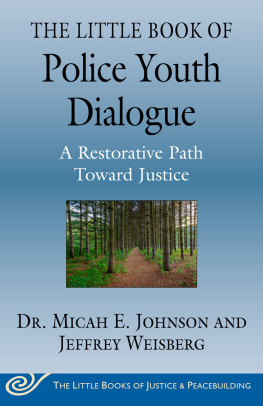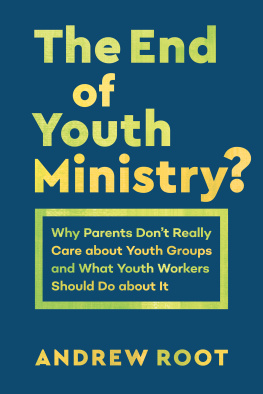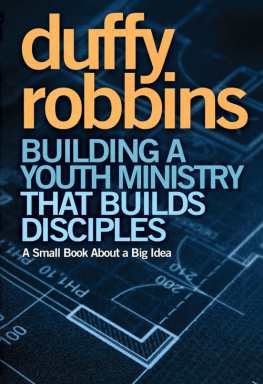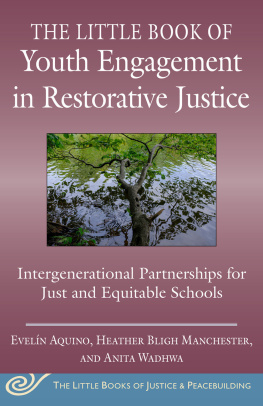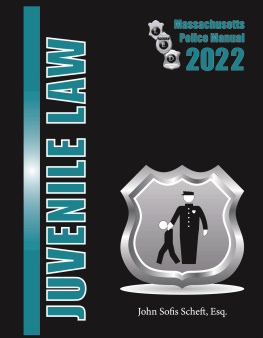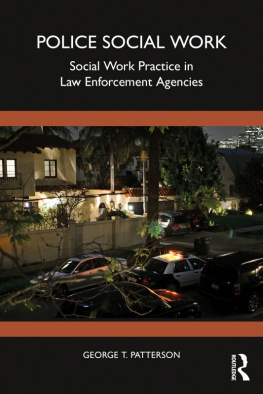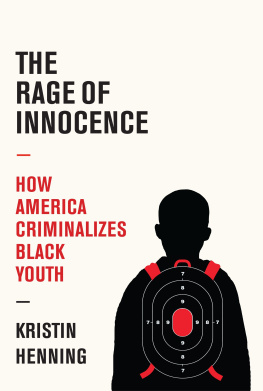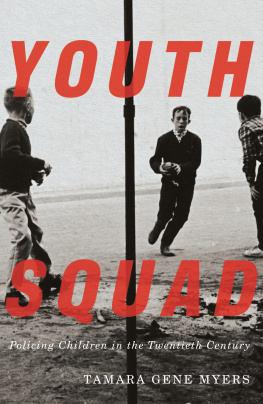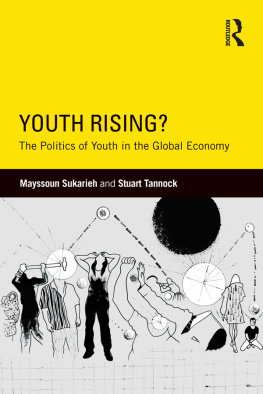


Published titles include:
The Little Book of Restorative Justice: Revised & Updated,
by Howard Zehr
The Little Book of Conflict Transformation, by John Paul Lederach
The Little Book of Family Group Conferences, New-Zealand Style,
by Allan MacRae and Howard Zehr
The Little Book of Strategic Peacebuilding, by Lisa Schirch
The Little Book of Strategic Negotiation,
by Jayne Seminare Docherty
The Little Book of Circle Processes, by Kay Pranis
The Little Book of Contemplative Photography, by Howard Zehr
The Little Book of Restorative Discipline for Schools, by Lorraine
Stutzman Amstutz and Judy H. Mullet
The Little Book of Trauma Healing, by Carolyn Yoder
The Little Book of Biblical Justice, by Chris Marshall
The Little Book of Restorative Justice for People in Prison,
by Barb Toews
The Little Book of Cool Tools for Hot Topics,
by Ron Kraybill and Evelyn Wright
El Pequeo Libro de Justicia Restaurativa, by Howard Zehr
The Little Book of Dialogue for Difficult Subjects,
by Lisa Schirch and David Campt
The Little Book of Victim Offender Conferencing,
by Lorraine Stutzman Amstutz
The Little Book of Restorative Justice for Colleges and Universities,
by David R. Karp
The Little Book of Restorative Justice for Sexual Abuse, by Judah
Oudshoorn with Michelle Jackett and Lorraine Stutzman Amstutz
The Big Book of Restorative Justice: Four Classic Justice & Peacebuilding Books in One Volume, by Howard Zehr, Lorraine
Stutzman Amstutz, Allan MacRae, and Kay Pranis
The Little Book of Transformative Community Conferencing,
by David Anderson Hooker
The Little Book of Restorative Justice in Education,
by Katherine Evans and Dorothy Vaandering
The Little Book of Restorative Justice for Older Adults,
by Julie Friesen and Wendy Meek
The Little Book of Race and Restorative Justice, by Fania E. Davis
The Little Book of Racial Healing,
by Thomas Norman DeWolf, Jodie Geddes
The Little Book of Restorative Teaching Tools,
by Lindsey Pointer, Kathleen McGoey, and Haley Farrar
The Little Books of Justice & Peacebuilding present, in highly accessible form, key concepts and practices from the fields of restorative justice, conflict transformation, and peacebuilding. Written by leaders in these fields, they are designed for practitioners, students, and anyone interested in justice, peace, and conflict resolution.
The Little Books of Justice & Peacebuilding series is a cooperative effort between the Center for Justice and Peacebuilding of Eastern Mennonite University and publisher Good Books.

Copyright 2021 by Dr. Micah Johnson and Jeffrey Weisberg
All rights reserved. No part of this book may be reproduced in any manner without the express written consent of the publisher, except in the case of brief excerpts in critical reviews or articles. All inquiries should be addressed to Good Books, 307 West 36th Street, 11th Floor, New York, NY 10018.
Good Books books may be purchased in bulk at special discounts for sales promotion, corporate gifts, fund-raising, or educational purposes. Special editions can also be created to specifications. For details, contact the Special Sales Department, Good Books, 207 West 36th Street, 11th Floor, New York, NY 10018 or .
Good Books is an imprint of Skyhorse Publishing, Inc., a Delaware corporation.
Visit our website at www.goodbooks.com
10 9 8 7 6 5 4 3 2 1
Library of Congress Cataloging-in-Publication Data is available on file.
Print ISBN: 978-1-68099-708-8
eBook ISBN: 978-1-68099-731-6
Series editor: Barbara Toews
Cover photograph: Howard Zehr
Printed in the United States of America
Contents
The Takers
T akers. Heavily armed tyrants invaded communities to terrorize and take loved ones away. Mike-Mike was born in Eatonville, Florida into an African American family. The first time Mike-Mike ever saw a police officer in person was when they came to take his father away to jail. The second time he ever saw a police officer, they came to take seven-year-old Mike-Mike away from his grandparents to live with his estranged mother. Mike-Mike thought to himself, if they can steal me away from my family, these takers can do anything they want. Weeks later, they took his father away again, this time for three years. Mike-Mike learned to write through drafting letters to his father in prison. Throughout his childhood, Mike-Mikes family lived in impoverished neighborhoods that were frequently targeted by police. As he grew up, he came to feel as if community members were being hunted by these Takers dressed as police officers. They would appear unannounced on his block and even at school to interrogate, terrorize, and take with impunity. The year he turned eleven, Mike-Mike himself suddenly became a target. Anytime he saw a police officer, they interrogated him as a criminal and searched his belongings. This occurred weekly. Even the most respected adults and elders in the community were afraid and powerless.
Mike-Mike began running whenever he saw a badge, a gun, or a uniform, heard sirens, or saw any signs of law enforcement. If he was unable to run, he put his hands in the air and remained as silent as possible, quietly praying that he would survive the Takers. At twelve, he was arrested, handcuffed, and taken to a juvenile detention facility because officers suspected he was truant, and his under-resourced school, which kept poor attendance records, confused his records with another students. Two years later, Mike-Mike was riding in the back seat of a car that was pulled over by the police. The police ordered Mike-Mike and his friends out of the car and aggressively shoved them onto the concrete on the side of the road, screaming and cursing orders at them. Mike-Mike had witnessed this routine many times, but somehow he mustered the courage to ask, Why are you doing this to us? What did we do wrong? They threatened to kick out his teeth if he did not shut his mouth and ordered him to stare at the ground. His friends fearfully whispered to him to be quiet. Say nothing. Do nothing. Mike-Mike obeyed. They laid there for an hour, handcuffed as the entire city, it seemed, drove by and stared at them. They were humiliated and traumatized. They were all linemen on the high school football team, and Mike-Mike had just made the honor roll for academic excellence. Their talent, character, and achievements could not shield them from these run-of-the-mill violent, traumatic, and potentially fatal encounters with law enforcement.
Next page
